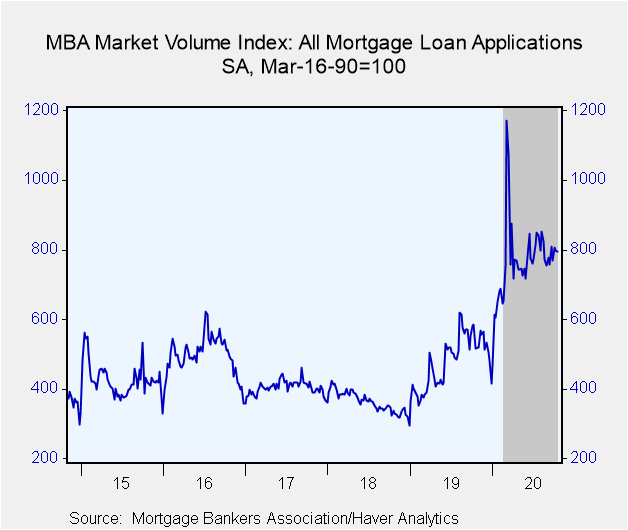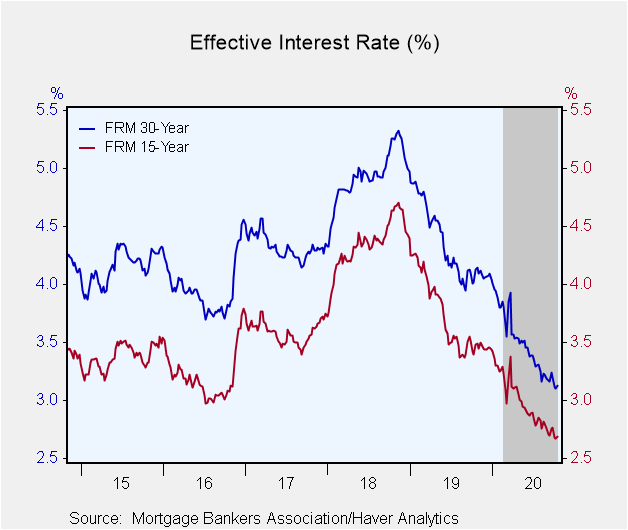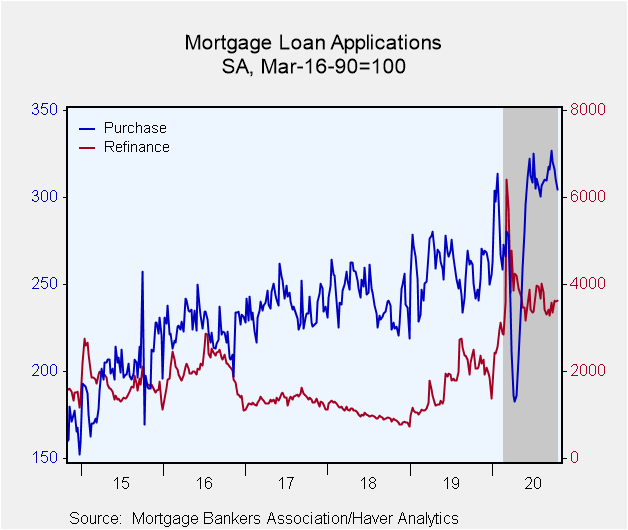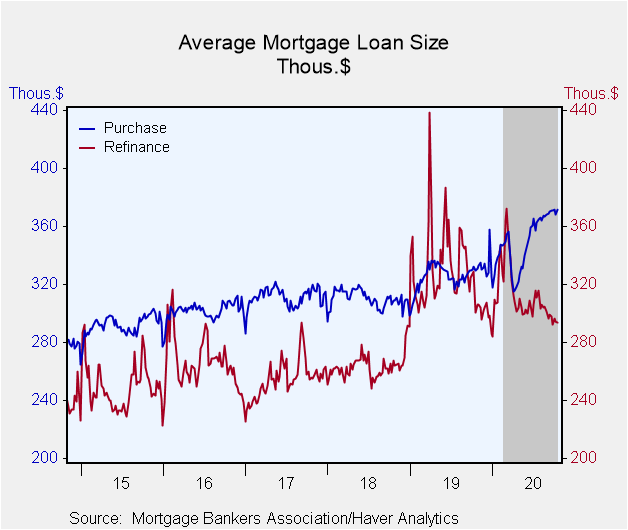 Global| Oct 21 2020
Global| Oct 21 2020U.S. Mortgage Applications Slip While Interest Rates Rise
by:Tom Moeller
|in:Economy in Brief
Summary
• Purchase applications continue to decline. • Mortgage interest rates rise slightly. The Mortgage Bankers Association Mortgage Loan Applications Index eased 0.6% (+54.3% y/y) in the week ended October 16, about the same as during the [...]
• Purchase applications continue to decline.
• Mortgage interest rates rise slightly.
The Mortgage Bankers Association Mortgage Loan Applications Index eased 0.6% (+54.3% y/y) in the week ended October 16, about the same as during the previous week.
Purchase applications declined 2.1% (+26.1% y/y), down for the fourth straight week. Applications to refinance an existing loan rose 0.2% (+74.3% y/y) following a 0.3% easing in the previous week. The refinance share of mortgage activity improved to 66.1% of total applications, down from the recent peak of 74.4% during April 2020. The adjustable-rate mortgage (ARM) share of activity eased to 1.9% of total applications.
Interest rates edged up last week. The effective rate on a 30-year fixed rate interest rate edged higher to 3.13% from the 3.10% record low during the prior week. The rate on 15-year loans edged up to 2.69% from 2.67%. The effective rate for a Jumbo mortgage loan rose two basis points to 3.42%. The rate on the 5-year adjustable rate mortgage increased to 3.07% from 2.84%.
The average mortgage loan size rose 0.2% (2.5% y/y) to $320,400. The average size of a purchase loan rose 0.9% (12.8% y/y) to $372,000. The average loan size to refinance eased 0.1% (-2.2% y/y) to $294,000.
Applications for fixed-rate loans fell 0.5% (+58.6% y/y) and applications for adjustable-rate mortgages weakened 2.9% (-37.7% y/y).
The survey covers over 75% of all U.S. retail residential mortgage applications and has been conducted weekly since 1990. Respondents include mortgage bankers, commercial banks and thrifts. The base period and value for all indexes is March 16, 1990=100. The figures for weekly mortgage applications and interest rates are available in Haver's SURVEYW database.
Key Elements of the Fed's New Monetary Policy Strategy from the Federal Reserve Bank of St. Louis is available here.
| MBA Mortgage Applications (%, SA) | 10/16/20 | 10/09/20 | 10/02/20 | Y/Y | 2019 | 2018 | 2017 |
|---|---|---|---|---|---|---|---|
| Total Market Index | -0.6 | -0.7 | 4.6 | 54.3 | 32.4 | -10.4 | -17.8 |
| Purchase | -2.1 | -1.6 | -1.5 | 26.1 | 6.6 | 2.1 | 5.6 |
| Refinancing | 0.2 | -0.3 | 8.2 | 74.3 | 71.1 | -24.3 | -34. |
| 30-Year Effective Mortgage Interest Rate (%) | 3.13 | 3.10 | 3.12 | 4.08
(Oct '19) |
4.34 | 4.94 | 4.32 |
Tom Moeller
AuthorMore in Author Profile »Prior to joining Haver Analytics in 2000, Mr. Moeller worked as the Economist at Chancellor Capital Management from 1985 to 1999. There, he developed comprehensive economic forecasts and interpreted economic data for equity and fixed income portfolio managers. Also at Chancellor, Mr. Moeller worked as an equity analyst and was responsible for researching and rating companies in the economically sensitive automobile and housing industries for investment in Chancellor’s equity portfolio. Prior to joining Chancellor, Mr. Moeller was an Economist at Citibank from 1979 to 1984. He also analyzed pricing behavior in the metals industry for the Council on Wage and Price Stability in Washington, D.C. In 1999, Mr. Moeller received the award for most accurate forecast from the Forecasters' Club of New York. From 1990 to 1992 he was President of the New York Association for Business Economists. Mr. Moeller earned an M.B.A. in Finance from Fordham University, where he graduated in 1987. He holds a Bachelor of Arts in Economics from George Washington University.










